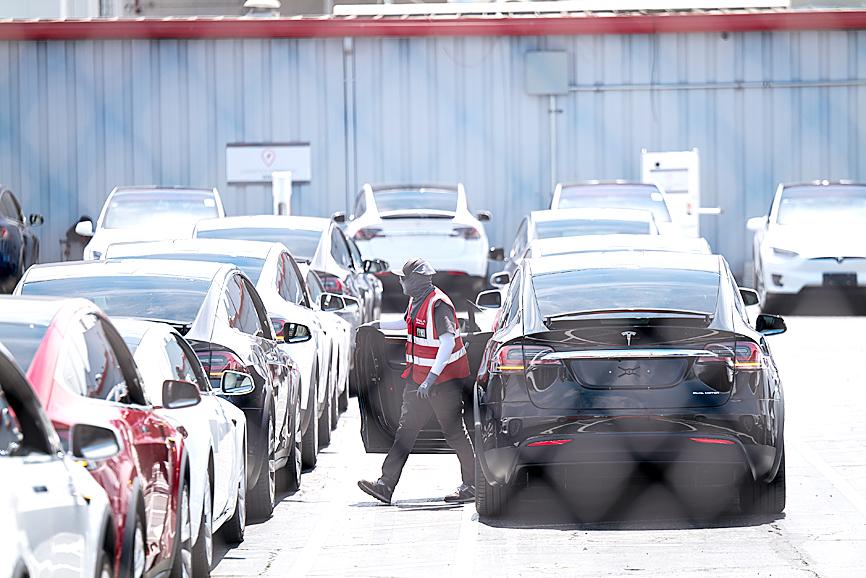Tesla Inc asked the Federal Communications Commission (FCC) for approval to market a short-range interactive motion-sensing device that could help prevent children from being left behind in hot vehicles and boost theft-prevention systems.
The California automaker is seeking permission to use unlicensed millimeter-wave sensors that would operate at higher power levels than allowed under existing rules.
Tesla’s device would utilize four transmit and three receive antennas driven by a radar front-end unit.

Photo: Bloomberg
Millimeter wave radar technology has advantages over other sensing systems, such as camera-based or in-seat occupant detection systems, Tesla said.
The radar-based system “provides depth perception and can ‘see’ through soft materials, such as a blanket covering a child in a child restraint,” it said.
It “can differentiate between a child and an object left on the seat, reducing the likelihood of false alarms” and can detect “micromovements like breathing patterns and heart rates, neither of which can be captured by cameras or in-seat sensors alone,” Tesla added.
The FCC is seeking public comment on Tesla’s request through Sept. 21.
The automaker said that the FCC in 2018 granted a similar request for a device of Alphabet Inc’s Google that works under identical operating parameters.
Tesla’s market value has surpassed retail behemoth Walmart Inc after an astounding surge in its shares over the past five months.
The stock, which touched a low of about US$350 in March, has almost quintupled since then and crossed US$2,000 on Thursday, more than 10 times the level it was trading at this time last year and closing at records on four of the past five trading days.
The relentless rally led Tesla to announce plans to split the stock to make it more accessible to individual holders, a move that can drive up demand for the shares.
The stock will start trading on the five-for-one split-adjusted basis on Aug. 31.
Each stockholder of record by the close of business yesterday received four additional shares of common stock for each one that they owned.
Additional reporting by Bloomberg

Taiwan’s rapidly aging population is fueling a sharp increase in homes occupied solely by elderly people, a trend that is reshaping the nation’s housing market and social fabric, real-estate brokers said yesterday. About 850,000 residences were occupied by elderly people in the first quarter, including 655,000 that housed only one resident, the Ministry of the Interior said. The figures have nearly doubled from a decade earlier, Great Home Realty Co (大家房屋) said, as people aged 65 and older now make up 20.8 percent of the population. “The so-called silver tsunami represents more than just a demographic shift — it could fundamentally redefine the

Businesses across the global semiconductor supply chain are bracing themselves for disruptions from an escalating trade war, after China imposed curbs on rare earth mineral exports and the US responded with additional tariffs and restrictions on software sales to the Asian nation. China’s restrictions, the most targeted move yet to limit supplies of rare earth materials, represent the first major attempt by Beijing to exercise long-arm jurisdiction over foreign companies to target the semiconductor industry, threatening to stall the chips powering the artificial intelligence (AI) boom. They prompted US President Donald Trump on Friday to announce that he would impose an additional

China Airlines Ltd (CAL, 中華航空) said it expects peak season effects in the fourth quarter to continue to boost demand for passenger flights and cargo services, after reporting its second-highest-ever September sales on Monday. The carrier said it posted NT$15.88 billion (US$517 million) in consolidated sales last month, trailing only September last year’s NT$16.01 billion. Last month, CAL generated NT$8.77 billion from its passenger flights and NT$5.37 billion from cargo services, it said. In the first nine months of this year, the carrier posted NT$154.93 billion in cumulative sales, up 2.62 percent from a year earlier, marking the second-highest level for the January-September

Asian e-commerce giant Shein’s (希音) decision to set up shop in a historic Parisian department store has ruffled feathers in the fashion capital. Anger has been boiling since Shein announced last week that it would open its first permanent physical store next month at BHV Marais, an iconic building that has stood across from Paris City Hall since 1856. The move prompted some French brands to announce they would leave BHV Marais, but the department store had already been losing tenants over late payments. Aime cosmetics line cofounder Mathilde Lacombe, whose brand was among those that decided to leave following